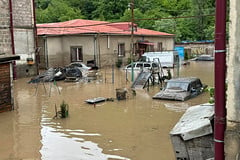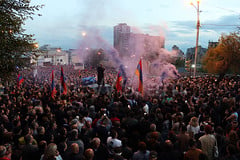
Stratfor intelligence company wrote an article on future developments on the Karabakh issue.
The experts predict “higher than usual” level of diplomatic activity on the Nagorno-Karabakh in the coming weeks.
“Low-level clashes between Armenia and Azerbaijan persist amid a flurry of diplomatic activity by larger powers such as Russia, Turkey and the West,” the article says.
The analysts warn that larger conflict may erupt at any moment, although the talks can be expected to gain renewed momentum. Meanwhile, “a broader settlement” on he status of Karabakh will remain elusive.
Reminding of numerous visits and meetings held by Armenian and Azerbaijani officials with Russian colleagues as well as Azerbaijani-Turkish contacts, the experts conclude that “the string of visits illustrates the geopolitical complexity of the Caucasus. The relationships of external actors there influence not only the governments that rule the region, but also the people who live there.”
“In Armenia, for example, hundreds of protesters took to the streets of Yerevan on 13 April to protest Russia’s weapons sales to Azerbaijan. (Though Moscow is strategically aligned with Armenia and has a military base in the country, it also maintains active political and security ties with Azerbaijan) The demonstrators claimed that the weapons significantly contributed to the recent flare-up in fighting — an accusation that is not without merit, since Azerbaijan would have been less inclined to launch operations against the region’s fortified defences without having heavily invested in its own weaponry over the past decade,” the article reads.
The diplomatic activity will continue in the weeks ahead, the analysts write, adding that “Yerevan wants to maintain the status quo in Nagorno-Karabakh.” It is not clear that Russia wants to change the status quo in the disputed region either, they argue.
“Instead, Moscow may be more interested in perpetuating a managed conflict, neither frozen nor hot, in which Russia plays the role of primary arbiter between Armenia and Azerbaijan. Such a scenario would strengthen Moscow’s influence in both countries,” the authors write.
“In the coming weeks, the level of diplomatic activity on the Nagorno-Karabakh issue will continue to be higher than usual as regional actors exert pressure on Armenia and Azerbaijan to hold peace talks. But a broader or even partial settlement to the dispute is unlikely to emerge in the near or medium term; there are simply too many complicating factors and parties with an interest in blocking a deal. As a result, military escalation will continue to be a possibility in Nagorno-Karabakh, with effects that reach far beyond the bounds of the small contested territory.”






















